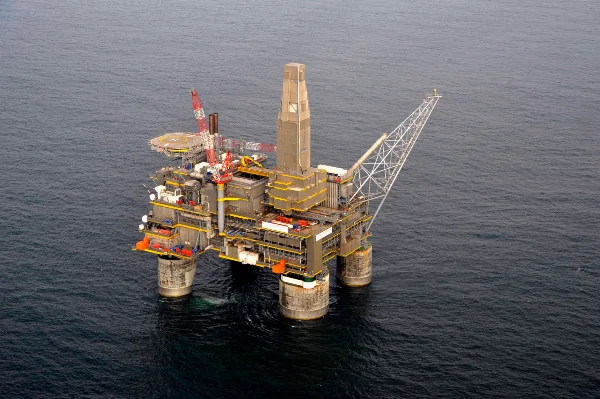

The Sakhalin oil gas project has played a key role in the vitalization of trade relations between Japan and Russia over the years (Image courtesy: Sakhalin Energy)
<p>
<strong>Japan has requested an explanation from Russia after the Kremlin&#39;s recent directive regarding Sakhalin oil fields in the Russian Far East which also features significant Indian investments.</strong></p>
<p>
Russian President Vladimir Putin signed a decree last Thursday following which Sakhalin Energy, the operator of the Sakhalin 2 project – the biggest offshore project in Russia which also provides for building the world&rsquo;s second-largest Liquefied Natural Gas (LNG) plant in Russia &nbsp;- will become Russia&#39;s property with a new company managing the future affairs. &nbsp;<br />
<br />
Currently, the Sakhalin Energy shareholders include Gazprom (50% plus one share); Royal Dutch Shell plc (27,5% minus one share); Mitsui (12.5%) and Mitsubishi (10%). The company operates under the Production Sharing Agreement (PSA) – the first in Russia – signed between Sakhalin Energy and the Russian Federation represented by the government and Sakhalin Oblast Administration in June 1994.<br />
<br />
&quot;Although this presidential decree does not immediately stop the import of LNG from Sakhalin 2 The government is currently collecting information, such as scrutinizing the impact of LNG imports on LNG imports and requesting explanations from the Russian side through diplomatic routes,&quot; Japanese Foreign Minister Yoshimasa Hayashi said on Tuesday.</p>
<p>
<img alt="Russia" src="https://www.indianarrative.com/upload/news/sakhalin.webp" style="width: 100%; height: 100%;" /></p>
<p>
<em><strong>A file photo of Russian President Vladimir Putin touring the Sakhalin region (Image courtesy: Kremlin.ru)<br />
</strong></em><br />
The Sakhalin oil gas project (Sakhalin 1 and Sakhalin 2) has played a key role in the vitalization of trade relations between Japan and Russia over the years. The Japanese government led by Fumio Kishida realises that the development of the Piltun-Astokhskoye oil field and the Lunskoye gas field off the north-eastern coast of the largest island in Russia is critical for country&#39;s fragile energy security, including stable supply of electricity and gas in Japan.<br />
<br />
&quot;The government would like to carefully consider countermeasures in cooperation with the Ministry of Economy, Trade and Industry so that the stable supply of LNG can be protected… We must scrutinize the details of the treatment of interests of Japanese companies and the impact on imports from the project,&quot; <a href="https://www.mofa.go.jp/mofaj/press/kaiken/kaiken24_000124.html">said</a> Hayashi.<br />
<br />
Russia-Japan bilateral relations have taken a nosedive after Moscow launched its &#39;special military operation&#39; in Ukraine on February 24. After Tokyo introduced unilateral restrictions against Russia, Moscow had retaliated with the termination of peace treaty talks.<br />
<br />
In May, as the G7 leaders committed to phase out dependency on Russian energy – including by phasing out or banning the import of Russian oil in &quot;timely and orderly fashion&quot; and in ways that provide time for the world to secure alternative supplies – Kishida had said that Tokyo has no plans as of now to back out from large oil and gas extraction projects with Moscow in the Russian Far East.</p>
<p>
<img alt="Sakhalin" src="https://www.indianarrative.com/upload/news/sakhalin_map.webp" style="width: 100%; height: 100%;" /><br />
<br />
&quot;Prime Minister Kishida has made a very tough decision for Japan, which relies on imports for oil as a major source of energy resources, but it is a time when the unity of the G7 is of utmost importance. He introduced that he decided to take measures to ban the export of oil produced in principle,&quot; said the Japanese Foreign Ministry then.<br />
<br />
On June 27, during his meeting with the US President Joe Biden on the sidelines of the G7 Elmau Summit in Germany, Kishida had again <a href="https://www.mofa.go.jp/na/na1/us/page4e_001263.html">vowed</a> Tokyo&#39;s commitment to continue &quot;close coordination regarding response to Russia&rsquo;s aggression&quot; against Ukraine.<br />
<br />
However, only time will tell if Putin&#39;s Sakhalin move manages to unsettle not only the energy situation in Japan but also its strong stand on Ukraine.</p>
<p>
<strong>Also Read: <a href="https://www.indianarrative.com/opinion-news/india-russia-japan-partnership-in-the-russian-far-east-can-be-a-game-changer-in-the-post-pandemic-world-103568.html">India-Russia-Japan partnership in the Russian Far East can be a game-changer in the post-pandemic world</a>&nbsp;</strong></p>
New Zealand's Deputy Prime Minister and Foreign Minister Winston Peters has arrived Kathmandu on his…
The Indian Army and the Mongolian Armed Forces will commence the 17th edition of their…
Pandi Ram Mandavi, a renowned artist from Bastar, Chhattisgarh, was conferred the Padma Shri award…
Taiwan's Mainland Affairs Council (MAC) criticised China on Wednesday for organising two summits for Taiwanese…
The East Turkistan Government in Exile (ETGE) vehemently denounces Mr. Francesco Frangialli, the Honorary Secretary-General…
Chairman John Moolenaar and Ranking Member Raja Krishnamoorthi of the House Select Committee on the…